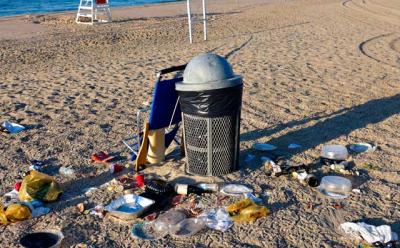Trash Can Dispute Continues

An olive branch extended by two members of the East Hampton Village Board was met with a combative reply at an East Hampton Town Trustees meeting on Tuesday. The issue is 16 garbage cans on the village’s ocean beaches.
The trustees, who manage the beaches on behalf of the public, insist that the receptacles encourage more litter, and have suggested they be placed in the parking lots. But village board members disagree.
“We felt like we were blindsided . . . with the immediate suggestion of how to take care of it before we knew there was a problem,” Barbara Borsack, the deputy mayor of the village, said. Ms. Borsack was referring to a letter the trustees sent asking that the receptacles be removed from the beaches. “We need a little time to discuss things,” she said. “We want to work with you, we’re all on the same team here.”
The village board usually discusses the beaches at its October work session, after the summer season, Ms. Borsack said, and considers improvements for the following year. An additional, nighttime garbage pickup and closer scrutiny of beach parties have been discussed, she said.
Deborah Klugers, a trustee who has been particularly outspoken about litter, was unmoved. She complained that an answer to the trustees’ request that the cans be removed from the beaches came via The Star’s July 2 issue, in which Mayor Paul F. Rickenbach Jr. stated that they would stay put.
“I don’t want this board to be looked upon as not wanting to participate in a dialog,” Ms. Klughers said. “We asked for the cans to be removed, and were told they’re staying. We asked that they be removed at night, and were told they’re staying. Now we’re being told they’re staying. If the pail is not on the beach and you put it in the parking lot, that’s where all this litter is going to accumulate,” she said.
“It’s regrettable,” said Richard Lawler, a village board member who was at the meeting with Ms. Borsack, “that this became such an adversarial situation from the get-go. I would hope that in the future you would contact us if you have an issue.”
The village has no immediate plans to move the receptacles, however. “We don’t subscribe to the premise that the cans are the problem. We started putting cans on the beach because there was a tremendous problem with garbage. It has improved dramatically,” Mr. Lawler said.
There are limits to the village’s budget and manpower, Ms. Borsack said, calling nightly removal of the receptacles, each of which weighs 80 pounds, unrealistic.
Photographs depicting litter, Mr. Lawler said, “reflect times when there is a problem. There are no pictures that reflect the overwhelming amount of times when there is no problem.” The village has not received a single complaint about the beaches, he said, reiterating previous statements.
Bill Taylor, a trustee and the town’s waterways management supervisor, defended the village. “It seems to me they’ve put a lot of thought and effort into it,” he said. “We should sit down and discuss it.”
Several trustees endorsed an additional, nighttime garbage pickup, while others called for a pilot program in which receptacles would be removed from one of the beaches. “If you give us a chance to have some discussion about it, we’ll let you know what our proposals are for next year,” Ms. Borsack said.
Diane McNally, the trustees’ clerk, agreed that she and Ms. Klughers should meet with village board representatives before the end of the summer, to which they agreed.
